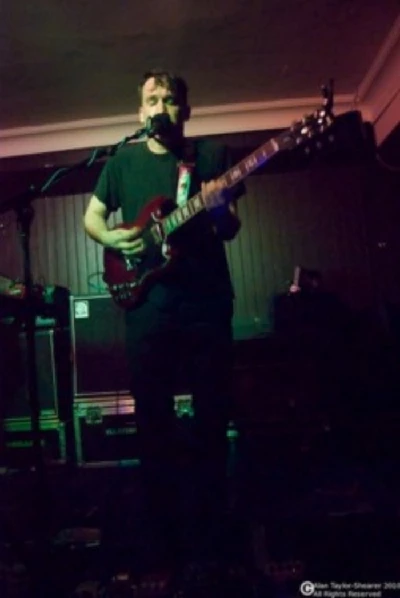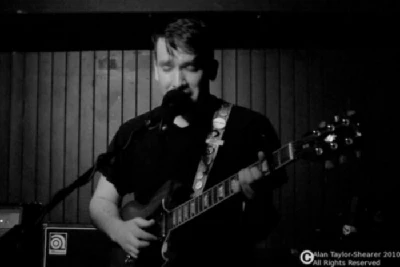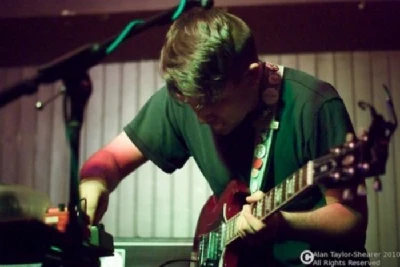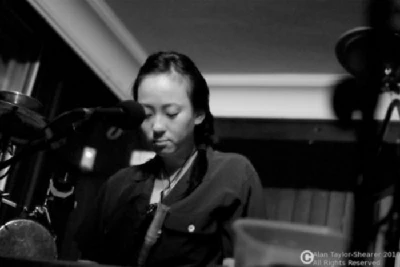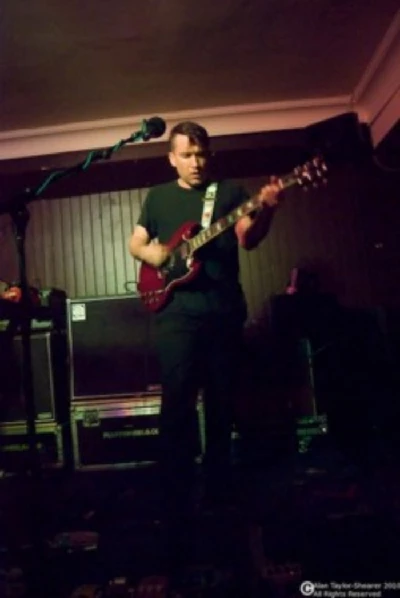published: 28 /
3 /
2010
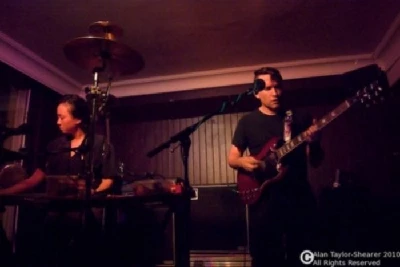
Jamie Rowland talks to founder and front man with Californian experimental art-rock band Xiu Xiu, Jamie Stewart, about his group's recent first full length tour of Britain, their tenth and latest album, and his early musical influences
Article
Jamie Stewart, under the guise of experimental art-rock band Xiu Xiu, has been writing and recording music since 2002 with a variety of collaborators (currently the band is made up of Stewart, Angela Seo and Ches Smith). In that time there have been ten Xiu Xiu albums, with the latest, 'Dear God, I Hate Myself' released on Kill Rock Stars in February this year.
Xiu Xiu’s music could never be described as easy listening, with its often dark and personal themes and tendency to veer from the well-trodden path of pop. But if, like me, you are someone who enjoys exploring those less-travelled areas and sniffing through the undergrowth for truffle-like musical treasures, you couldn’t get much better reward than picking up a Xiu Xiu record (apologies for the laboured metaphor).
Fresh from touring the UK to promote the new album, Stewart spoke to Pennyblackmusic from his home in California about his genuine passion for music, influences from his formative years and the trials of a band on the road.
PB: You just got back from your UK tour promoting 'Dear God, I Hate Myself'. How did you find it?
JS: Yeah, surprisingly good. We had never done a full tour there so I didn’t really know what to expect, but everyone was really nice. I don’t feel ashamed for having done it.
PB: Did you have to do a lot of interviews while you were touring? Do you enjoy that aspect of being in a band?
JS: We did a few. It really depends on the interview, if the person is asking interesting questions and paying attention to what we’re saying it doesn’t seem like an interview. It just seems like a conversation about art or politics or whatever. But if the person is… you know, we’ve been around for 8 years or something and if the person is asking “Where does your band name come from?”, that I’ve answered probably more than a thousand times then it gets a little robotic I guess.
One person actually mentioned that my answers were robotic, but they were asking all questions like that. I can’t make up a different answer for “where’s the band name from” every time!
PB:It seems like an odd question to ask anyway; I think the first thing that came up when I was researching your band for this interview was where the name came from.
JS: I think that’s just it; if someone does any sort of research at all then they’re going to ask more interesting questions than if they really don’t care.
One person that interviewed me, after the interview they gave me a bottle of elderberry gin – so that was a nice perk. Very sweet person.
PB: Was it nice?
JS: It was astonishing, yeah. I’m not even supposed to be drinking right now, but I thought, “Well, this will be too fabulous”. And indeed it was!
PB: In terms of touring and recording, do you prefer one over the other, or do you enjoy them both for their own merits?
JS: If I could only do one or the other I would do recording, but I certainly enjoy playing. The physical aspect of it on tour gets to be a little tiring. I don’t stop appreciating the music or anything, but it just gets exhausting.
The classic gripe about being on tour is that everybody’s just sitting in a car all the time, and then you’ve got to rush and do sound check and then play and then try to go to sleep – that gets a little bit grinding, but the hour of playing is still very good though.
PB: I suppose that’s what makes it all worth it, assuming the gig or the tour is going well.
JS: Yeah. I can’t remember what singer said this, but it’s the classic joke of “You don’t pay me for the hour of playing, you pay me for the other 23 hours of the day”.
But versus recording, at least for me that’s the point at which the subjects of the songs are explored most deeply and the most worked out, so that’s when the combination of emotionality and creativity is most likely to occur, and that’s the part of music that I think is most interesting.
PB: I know what you’re saying; when you’re playing you’re exercising a different…er…what am I trying to say?
JS: I think I know what you’re getting at, and yeah exactly that. It explores a different part of your relationship with and for the music.
PB: Yes, exactly that. And thank you for understanding me when I was being less than eloquent. In terms of getting to the heart of your songs, some of your lyrics come across as very personal; with a song like ‘Dear God, I Hate Myself’ for example, is that the case or are you exploring feelings more generally?
JS: Well the song was written as an expression of my personal feeling. The lyrics are about my personal experience, but the point of writing it was that potentially if someone listens to then they can relate to it themselves. The point of writing is not to voice my troubles with self-loathing upon the world but if someone else is experiencing that same feeling then perhaps they could relate to that in some way or get something from that.
PB: One of the things that came up in my preparations for this interview was that when I told people I was interviewing Xiu Xiu they said “What kind of band are they?” and I had no idea how to describe you. If you’re asked what kind of band you’re in, how do you answer?
JS: Well, it would really depend on who was asking – if my mom’s friend at Thanksgiving was asking, I’d probably say I was in a pop band, but if I was talking to a journalist I would probably give a fairly long-winded answer!
PB: Do you think it’s a positive thing to avoid being pinned down with labels?
JS: I don’t think it really matters. It doesn’t bother me if we’re described in any particular way. If that someone would have a perception of what we’re doing that’s different from mine I would think it’s only interesting. I don’t feel as if we have some sort of singular manifesto that is important to me that everybody understand it in the way I want them to understand it. Like I was kind of saying before, the songs are for other people to get something out of. They’re not for me to feel as if people understand who I am.
PB: Is there no therapeutic aspect to exploring these feelings in your lyrics?
JS: I don’t know if it’s therapeutic necessarily in so far as I feel relieved by doing it, but I think I would be fairly lost if I wasn’t able to do it. It might not be therapeutic as much as it is “required maintenance”.
PB: So it’s more a case of trying to understand those feelings better rather than trying to fix them?
JS: That’s exactly it, yeah.
PB: Looking back over your past releases, I’ve noticed you like to do a lot of covers of other people’s songs, most noticeably on your covers EP, 'Tu Mi Piaci'. When you pick songs to cover, are they always songs that you love?
JS: Oh yeah, always songs that I totally love. The main motivation for doing them is just an attempt at saying thank you to that song for existing. Someone asked us to do a record of songs that we hated and I just couldn’t see the point of it. I mean, it would be amusing, but I absolutely, absolutely, absolutely love music, and to do something that was kind of a joke on music I think would make me want to barf.
PB: When I’ve spoken to bands in the past, one of the things that they’ve said in regards to covers was that they might not have liked a particular song, but they thought that they could see some potential they might be able to bring out of it.
JS: Oh yeah. No, it’s always a song that I think is a total work of genius that changed my life and I just do it as a thank you note more than anything else.
PB: Looking at your albums as a whole, do you approach them with a particular idea of how they will be and what you want to explore with them, or is it more of a natural occurrence that comes out of writing the songs?
JS: It really depends on the record. With this new one, at the beginning I knew, just in the most general way, what I wanted the shape of the record to be like. With other ones, it’s just these are ten songs that we wrote this year and these are the ones that will be on the record. It just depends.
PB: I wanted to explore some of your influences and musical background by talking to you about some landmark records from your life. Could you tell us, for example, what was your first ever record?
JS: The first record I ever owned was given to me by…I had a foster sister, and she gave me 'Abbey Road', and disturbingly she gave me a Styx record called ‘Grand Illusion’. Actually the first song I ever wrote was a Weird Al Yankovic style parody of ‘Grand Illusion’ called ‘The Grand Fart’. Then I think the first record I ever bought with my own money was 'Purple Rain'.
PB: So quite mainstream albums as you say, but I think that when people hear a band that might be described as a bit left-of-centre, bands like Xiu Xiu for example, they might think, "Wow, this guy grew up listening to some really messed up stuff", so it might be quite surprising.
JS: Actually, when I was growing up my dad was in the music business, and in the part of Los Angeles where I was growing up everybody was listening to the most base, rotten hair metal like Motley Crue, Poison and all those useless bands. But my dad would not let me listen to those bands, and the records that he had around the house were all Motown and Stax Records or Talking Heads, stuff like that. So fortunately early on, that’s what I had the chance to listen to.
PB: So you were saved from Motley Crue?
JS: Yeah, and I think because my dad made me listen to higher quality records I went on to – even when I was relatively young, I tried to distinguish between what was garbage and what was really worth listening to. I mean, 'Purple Rain' is still one of my favourite records. My friends were buying things like Pyromania by Def Leppard at the time.
And this doesn’t have anything to do with me or my own discerning ears as a junior high student, it’s just that my dad wouldn’t have stood for anything that was crap.
PB: I think that’s a good thing; if you’re exposed to more diverse music early on, I think you’re more likely to search out other things that you might not otherwise hear.
JS: That’s what I was trying to say in a very long-winded and meandering way, yeah.
PB: Oh no, it was very articulate! On the topic of records, if you were having a really bad day and you wanted to pick up your mood with a particular song or album – or maybe if you wanted to wallow in that bad mood, as some people do – what would you listen to?
JS: It’s sort of a pathetic answer… I don’t know I’d probably put on ‘The Queen is Dead’ or something! I think me and every other white person in the entire world would probably answer that way.
PB: You may well be right, there. Finally, and this might be quite tricky, but if you can imagine meeting someone who’s never heard any decent music – maybe they’ve only ever listened to Motley Crue and Poison – and you wanted to introduce them to what good music really can be, what record would you give them?
JS: That’s an interesting question. I don’t whether it would be best to ease them into it or just throw them headlong into hell… I think I would err on throwing them headlong into hell, and there’s this Penderecki orchestral piece about Hiroshima that I think if all you had listened to was total garbage would probably set you off on the righteous path.
PB: Well if I were more intelligent I could probably take all those choices and make some brilliant statement about how they all equate to the music of Xiu Xiu, but sadly I don’t have that kind of mental capacity.
JS: Well I think if you took 'Purple Rain', 'The Queen is Dead' and Penderecki that probably sum up Xiu Xiu pretty well!
PB: Thank you.
The photographs that accompany this article were taken exclusively for Pennyblackmusic by Alan Taylor-Shearer.
Picture Gallery:-
